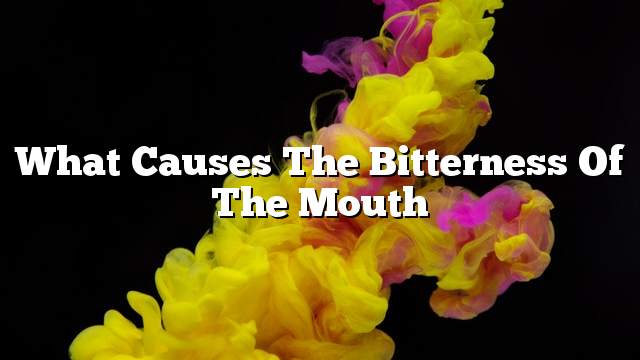Change the taste of the mouth
Taste buds change constantly in the mouth, and the body’s hormones, food type and various types of drugs influence the function of taste buds, which may lead to the same taste of different types of food. The change of oral taste may occur as a result of different conditions or everyday events. , And may occur after eating or when coughing, or may change the taste of the mouth due to the intake of some types of drugs in addition to smoking, and usually the change of taste temporary change ends with the end of the underlying cause, noting that the lack of care of oral health and teeth carelessness Their infusion leads to a strange taste in the mouth.
There is a so-called taste disorder (Dysgeusia), a condition in which the patient is difficult to taste, resulting in the appearance of taste unpalatable in the mouth, and the taste of the taste of metallic taste or bitter or salty, and may result from this imbalance of infection Flu, or colds, or sinusitis, as well as from various infections and environmental factors. Exposure to radiotherapy in the treatment of cancer in the head and neck may lead to an undesirable taste in the mouth. In addition, Pregnancy may feel a change in The taste of the mouth may be accompanied by a change in the taste of the mouth with a feeling of nausea and dry mouth.
Causes of bitterness of the mouth
There are many causes and conditions that result in a sense of taste in the mouth, the most important of these cases are as follows:
- Constipation in children and in adults too, and constipation is the lack of movement of the intestine, where not more than three movements during the week, and accompanied constipation the occurrence of abdominal pain.
- The interaction of drugs with each other leads to a taste of bitter taste, and the side effects of some drugs also cause this taste.
- Cyanide poisoning.
- Dry mouth.
- Gastroesophageal reflux disease (gastroesophageal reflux disease), as the acid in the stomach rises to the esophagus, resulting in a feeling of bitter taste or acid.
- Chemotherapy or bioactive chemotherapy for cancer patients resulting in a bitter, metallic or salty taste.
Reasons for mineral taste
There are many reasons that lead to a metallic taste in the mouth, the most important of which are the following:
- Some types of medicines: These drugs, which leave behind a metal medicine blood pressure treatment such as Captopril (Captopril), and the treatment of blue water in the eye (Glaucoma), and some types of antibiotics such as Clarithromycin and Metronidazole, Osteoporosis.
- Chemotherapy and radiotherapy: There are some types of chemotherapy that lead to the sensation of the patient with metallic taste in addition to the contribution of radiotherapy also, and studies suggest giving the patient in this case some of the nutritional supplements and vitamins that reduce the appearance of this taste, such as vitamin D and zinc, and Lack of certain elements in the body may lead to a sensation of the same mineral taste in the mouth.
- Sinus problems include sinus sensitivity, colds, and sinusitis.
- Pregnancy: A pregnant woman may feel a metallic taste in her mouth during the first months of pregnancy, and this is not a known cause in particular.
- Sensitivity of some types of foods.
- Lack of attention to clean mouth and teeth.
Treatment of oral taste change
The treatment of oral taste change requires beginning to know the underlying cause of the problem. If a particular type of medication is the cause of the change in the taste of the mouth, the treatment is to stop this medicine or to replace it with another type. In the case of a particular medical condition, The bad will disappear when healing, in addition to the need to emphasize that the cleanliness of the mouth and teeth have a vital role and important in maintaining the integrity of taste. There are some actions that can be taken in cases of bad taste in the mouth and that will alleviate the problem, including the following:
- Check your doctor if you have a bad taste: to make sure there are no infections or health problems behind this bad taste.
- Maintaining dental cleaning using the brush and dental thread: The spongy spongle is used with a toothpaste or baking soda solution.
- Cleaning the tongue: The tongue is cleaned at the time of cleaning the teeth itself, and the tongue contains a cap of fine bristles containing taste buds and nerve endings, and work these protrusions or capillaries such as sponge, which collects the remnants of eating bacteria, fungi and residues of epithelial cells inside the mouth, That will change the taste of the mouth.
- Use of oral lotions: Biodegradable soda solution can be used until visiting the doctor.
- Using the tongue scraper: This scraper helps to remove the accumulated debris.
- Too much fluid intake, and sugar-free chewing gum reduces the problem.
- Eat in plastic containers in case of a bitter or metallic taste.
- If a person suffers from loss of all or part of his ability to taste, there are some procedures that help to improve the ability to taste, such as attend the person’s meals of different colors and diverse textures, and use different types of herbs and spices to give a strong flavors of food.
